Helinox vs OEX vs Vango: the ultimate camping cot showdown
We tested three popular camping cots. Which one is best for a comfortable night’s sleep under the stars?

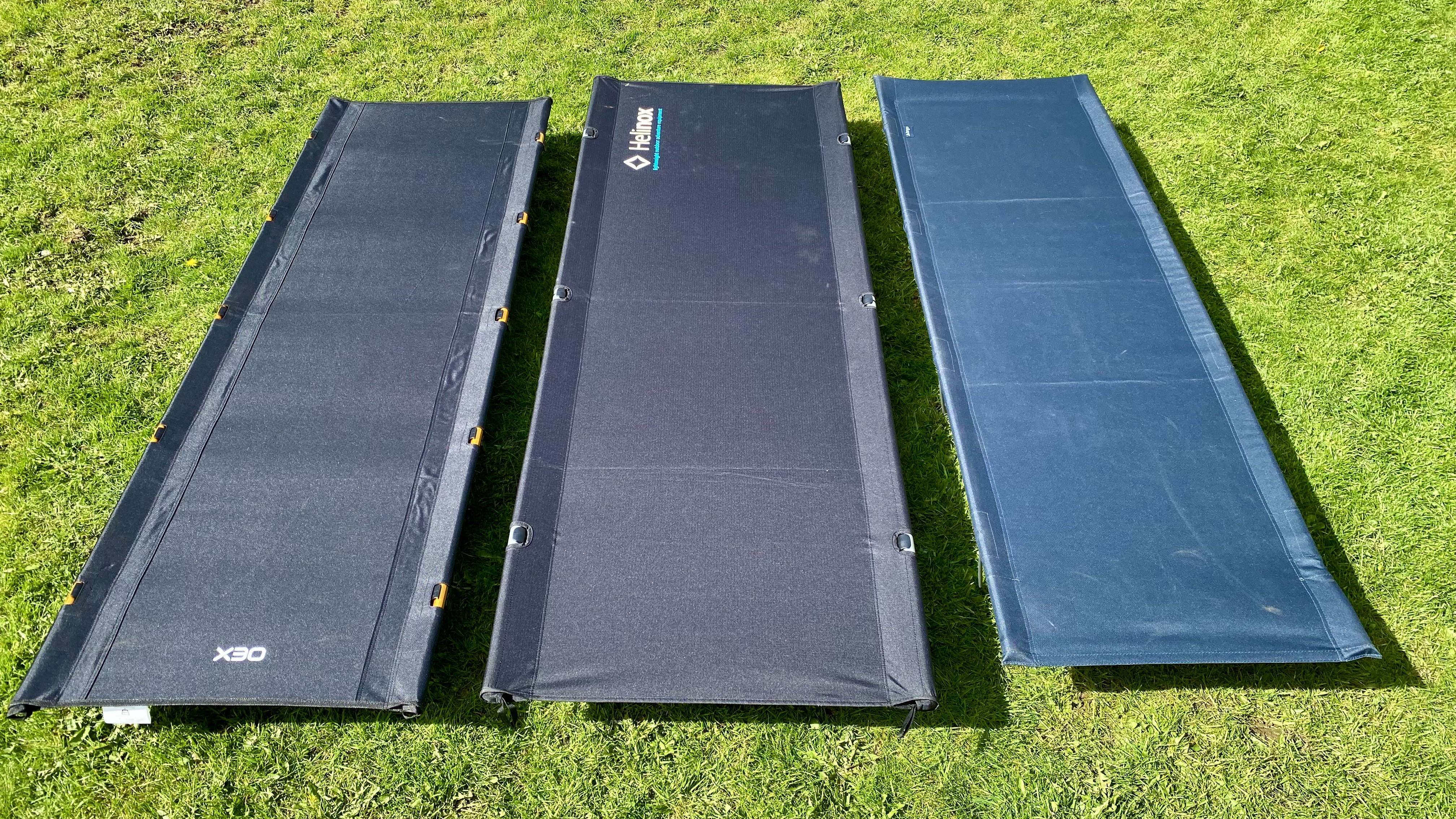
I love camping, but there’s one thing that always makes my heart sink a little—the thought of getting onto a wobbly air bed and achieving a decent night’s sleep without being cold or, worse, on a hard floor because of a slow puncture.
So I started doing some research – a lot of research actually – into sleeping arrangements for backpackers and campers in general and finally alighted on what many avid outdoors folk consider to be the ultimate lightweight solution for a cosy night’s rest under the stars – a camping cot (or camp bed as we tend to call it in the UK). So I promptly called in a trio of lightweight camp beds from high-end market leader Helinox, outdoor equipment manufacturer OEX and camping specialist Vango.
I shall now set up all three of these camping accessories to see which cot provides the best bang for the buck and which model works best for supreme comfort, design, portability and ease of use.
Helinox vs OEX vs Vango camping cots
What’s so good about a camping cot?
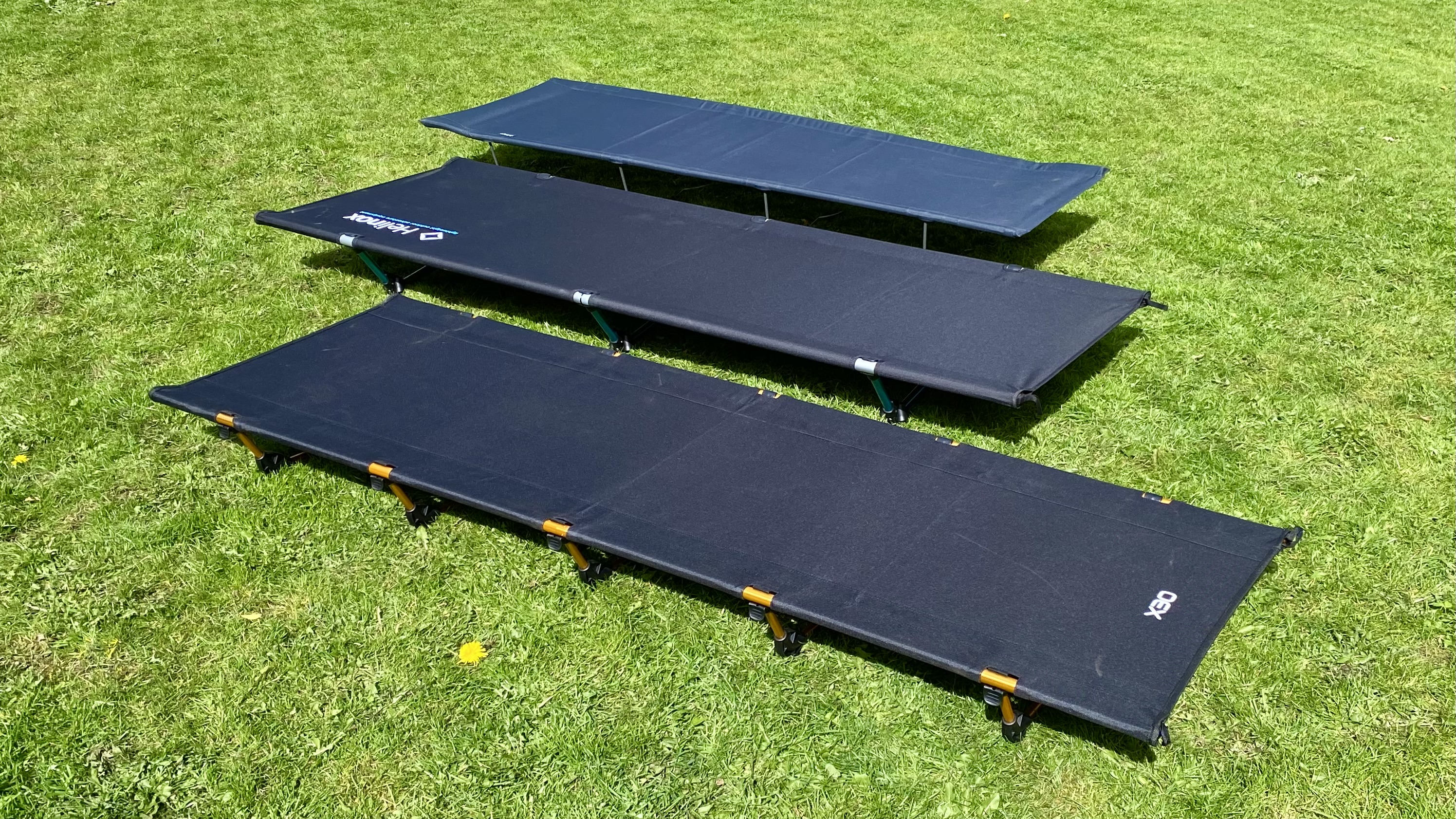
A camping cot is a bit like one of those old fashioned stretchers they used in World War I, only today’s models are about ten times lighter and, in most instances, small enough when folded to attach to a backpack.
Most camping cots are comprised of a pair of parallel frame tubes, a series of vaguely flexible aluminium cross struts with legs attached and a strong, highly stretched polyester fabric that has just enough ‘give’ to provide good comfort while being firm and supportive enough to hold body weights of up to around 145kgs.
Since camping cots sit several inches above the ground, they’re less susceptible to absorbing ground temperature, though it is still advisable to place some form of thin insulation between the cot’s stretched fabric platform and the sleeping bag. They’re also much easier to get in and out of than an air bed and you can sit near the edge to put your socks on without sinking into the floor. Once in situ, a camping cot also provides handy storage space beneath.
At this juncture, I should add that while most cots are absolutely ideal for backpacking and comfortable enough to sleep on as is, if you really want to hit the slumber jackpot, I would recommend incorporating a self-inflating foam mattress or, if you're travelling light, one of the best camping mats. This combination of a cot and a foam-filled mattress or mat provides the most comfortable sleeping experience possible, short of taking your house bed with you.
Get all the latest news, reviews, deals and buying guides on gorgeous tech, home and active products from the T3 experts
For this particular comparison, I selected the high-end Helinox One Cot Convertible, the mid-to lower-priced OEX Ultralite and the budget-priced Vango Hush.
Let’s examine these three camping cots in greater detail. There is also one more brilliant but not so portable alternative at the bottom of the page.
Price and availability
The Helinox Cot One Convertible is available direct from Helinox where the three solid colours retail for £330 and the rainbow variant at a knockdown £247.50. Alternatively try Ellis Brigham where it also sells for the standard £330.
If you’re looking for a cheaper alternative, the OEX Ultralite Folding Cot can be found at Go Outdoors (£85) or Blacks (£95) and Amazon (£90)
And if you’re on a tight budget, go for the Vango Hush which is available direct from Vango, priced at just £35, Attwoolls Outdoors (£39.95) and Snow+Rock (£35).
Design & features
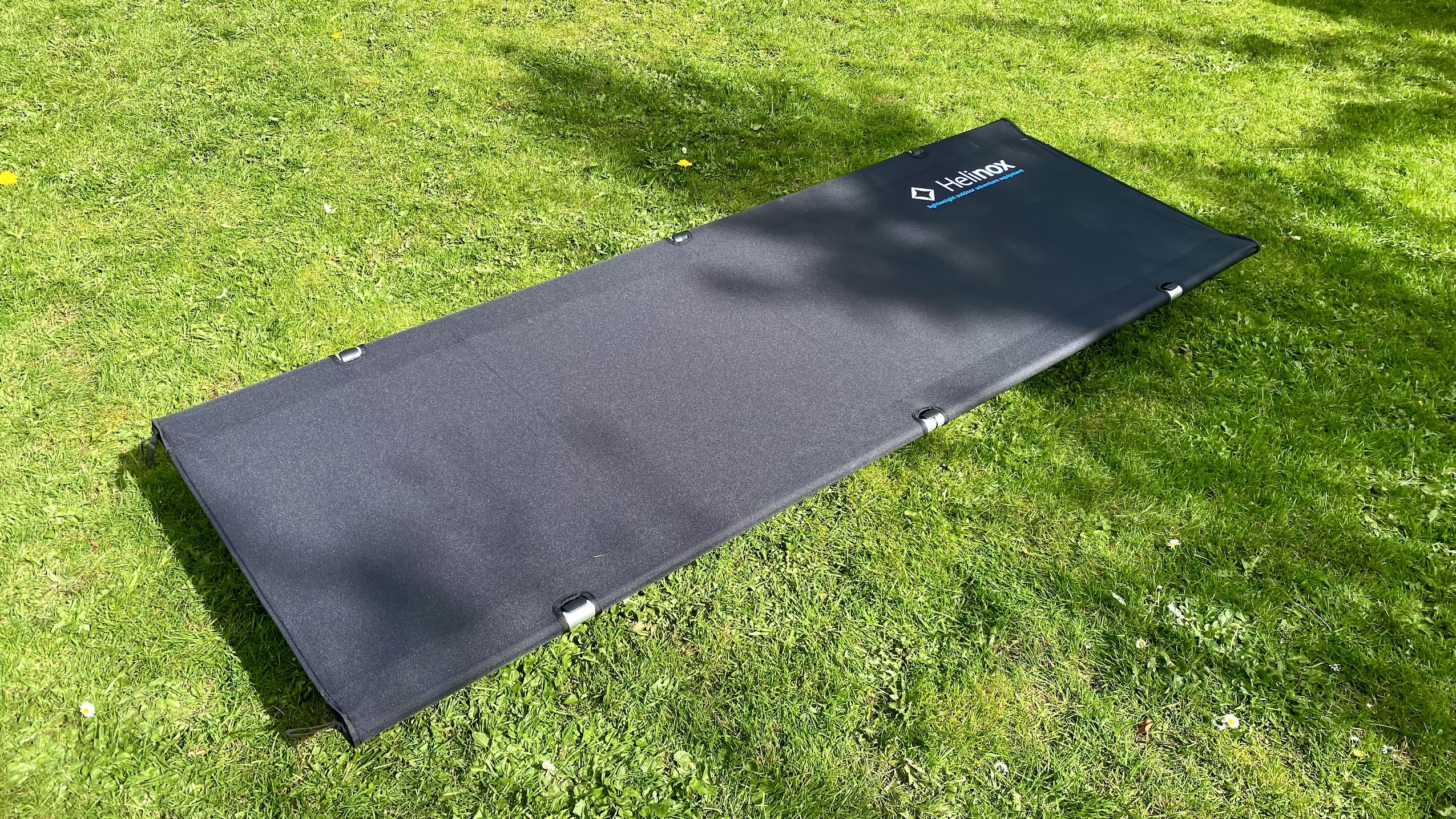
Helinox Cot One Convertible
Let’s kick off with the Helinox Cot One Convertible. Available in black, tan, rainbow and cobalt blue, this is one of the most expensive and lightest cots you can buy and, inarguably, one of the very best.
Helinox is the market leader in this area, and it's no wonder—the amazing craftsmanship and use of high-end materials throughout make this model the go-to solution for any discerning camper after an extremely lightweight and tidy package for backpacking, car and bike camping or home use in emergencies.
Mind you, the £330 asking price could be a big hindrance to all but the most wealthy and fervent campers. Nevertheless, I consider this the creme de la creme of lightweight camping cots, so it's well worth the extra outlay.
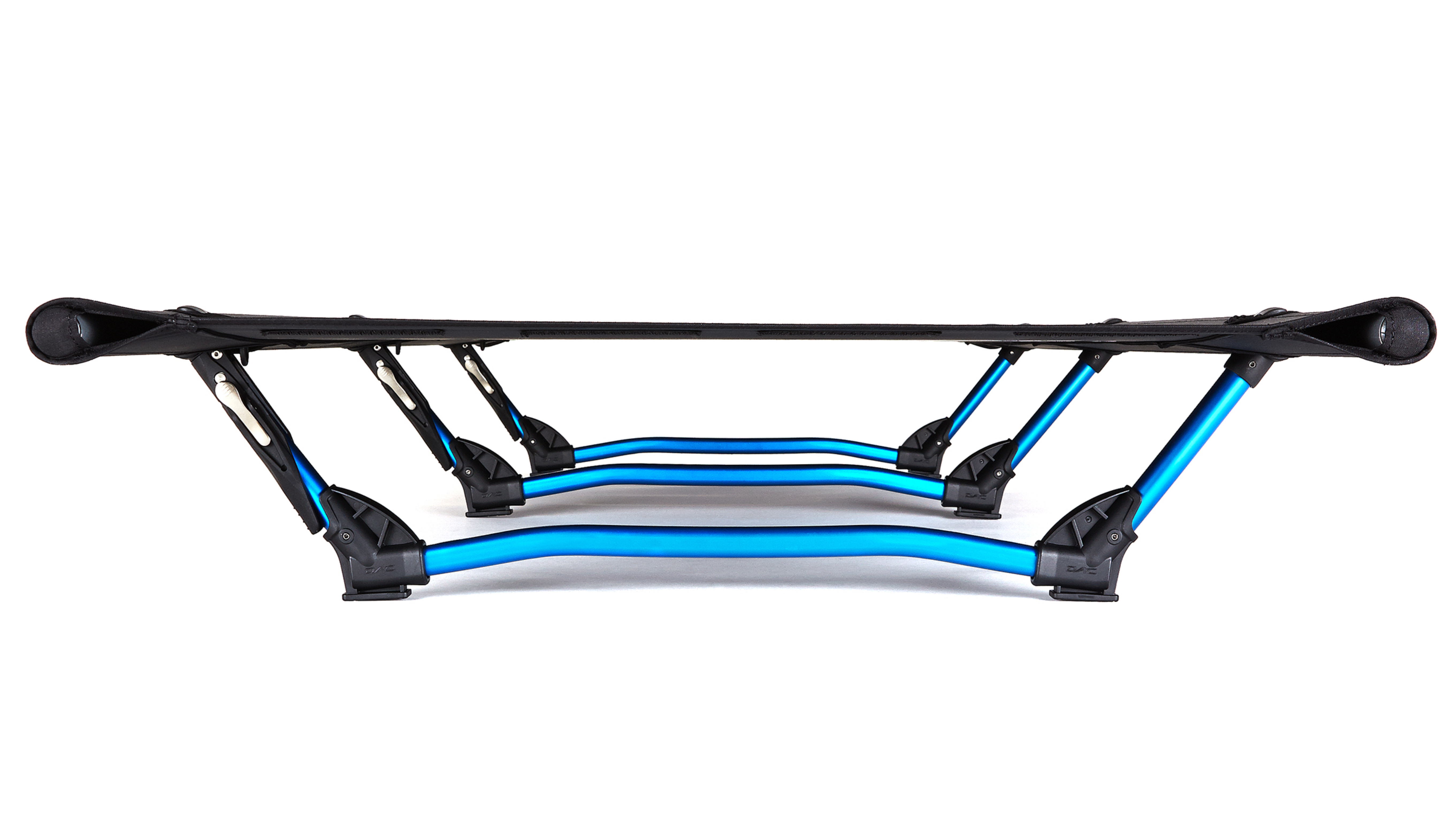
Helinox Cot One Convertible utilises an ingenious lever system to attach the legs
The Helinox Cot One Convertible measures 191 x 67cm and comes with a proprietary DAC aluminium alloy frame in the shape of two long, beefy and extraordinarily light elasticated poles that slide into a sleeve on each side of the fabric sleeping surface and just three ingenious aluminium leg assemblies.
Where the OEX and Vango require a lot of muscle power to stretch the fabric so the leg assemblies can be snapped into place, the Helinox Cot One Convertible uses an innovative lever lock system that makes putting it up and taking it down a veritable breeze. Yes, you will need strong-ish hands to close the leg levers, but once you’ve mastered the technique, subsequent assemblies will become a lot easier. Just be sure to orientate the elasticated leg arches the correct way. Impressively, this bed took just five minutes to erect and another five to disassemble and pack it away into its tough, weather-resistant canvas-like bag.
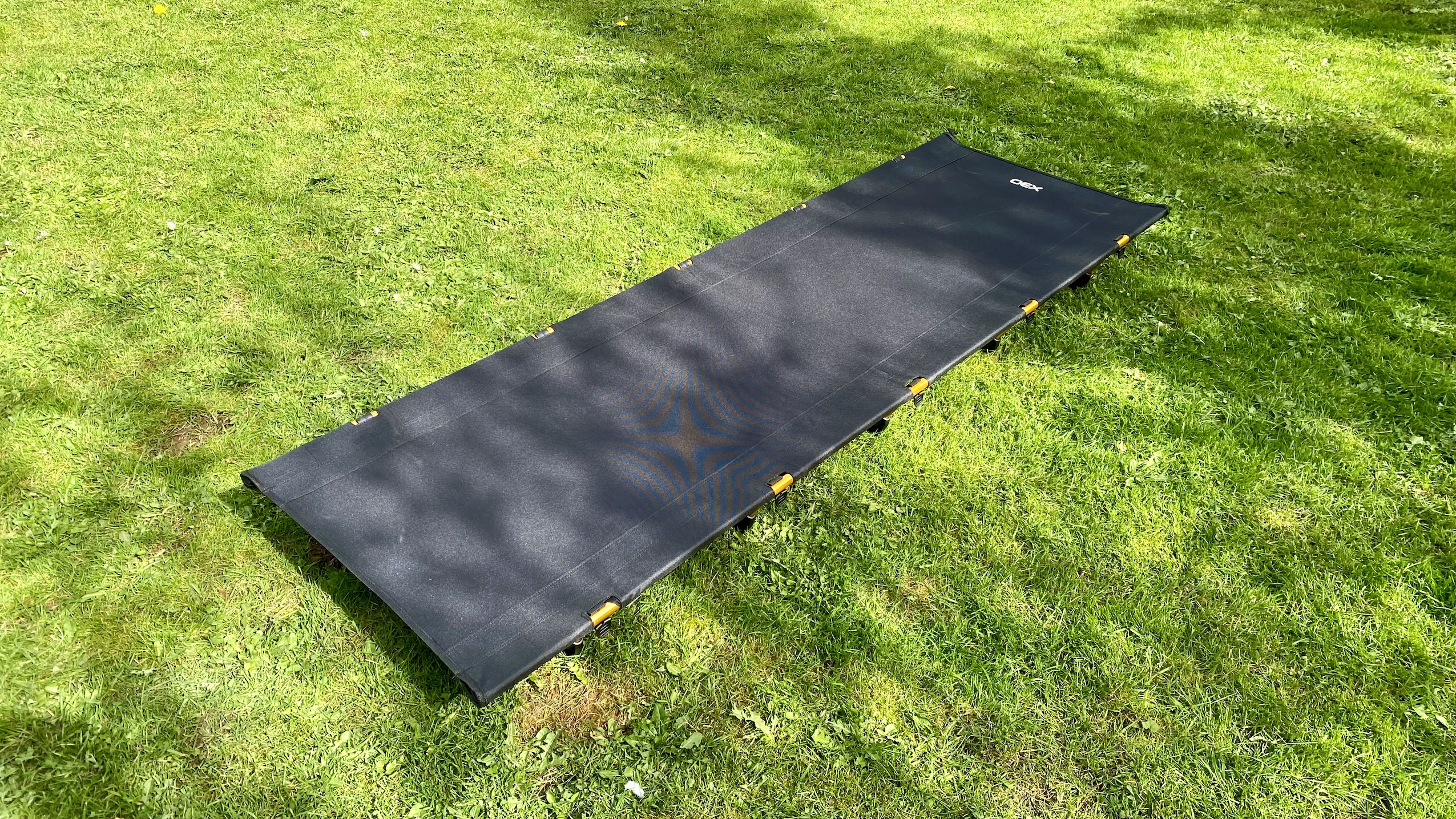
OEX Ultralite
By comparison, the OEX Ultralite Folding Cot is around a quarter of the price of the Helinox – around £85. Available from Go Outdoors and a few other outlets, this cot is excellent value for money. Like the Helinox, the OEX uses aluminium for both the elasticated frame tubes and its five leg assemblies. At just 2.68kgs, the OEX is almost as light as the Helinox though the assembly process is a lot more difficult. And by ‘difficult’ I mean difficult with a capital D. In fact, if you’re small bodied, you might not have the strength to bend its five aluminium leg assemblies into position.

You'll need some epic strength to lock the OEX's five legs into position
Thankfully the manual explains the process in detail so stick to the guidance and place the unit side on with one of the supporting aluminium poles on the floor. Now stand over it, clip in the bottom strut and use all your might to bend each aluminium leg so the top clip can make good purchase.
I would advise wearing a pair of rubber gardening gloves to get a better grip on the strut and to prevent pinching your hands in the process because your hands will be wobbling a lot as you reach for the last few centimetres. Don’t worry about breaking a leg because they’re designed to bend enough to fit – though you might not believe that when putting all your weight behind it. Thankfully, once you’ve grasped the technique, assembly isn't quite as exhausting as the first time.
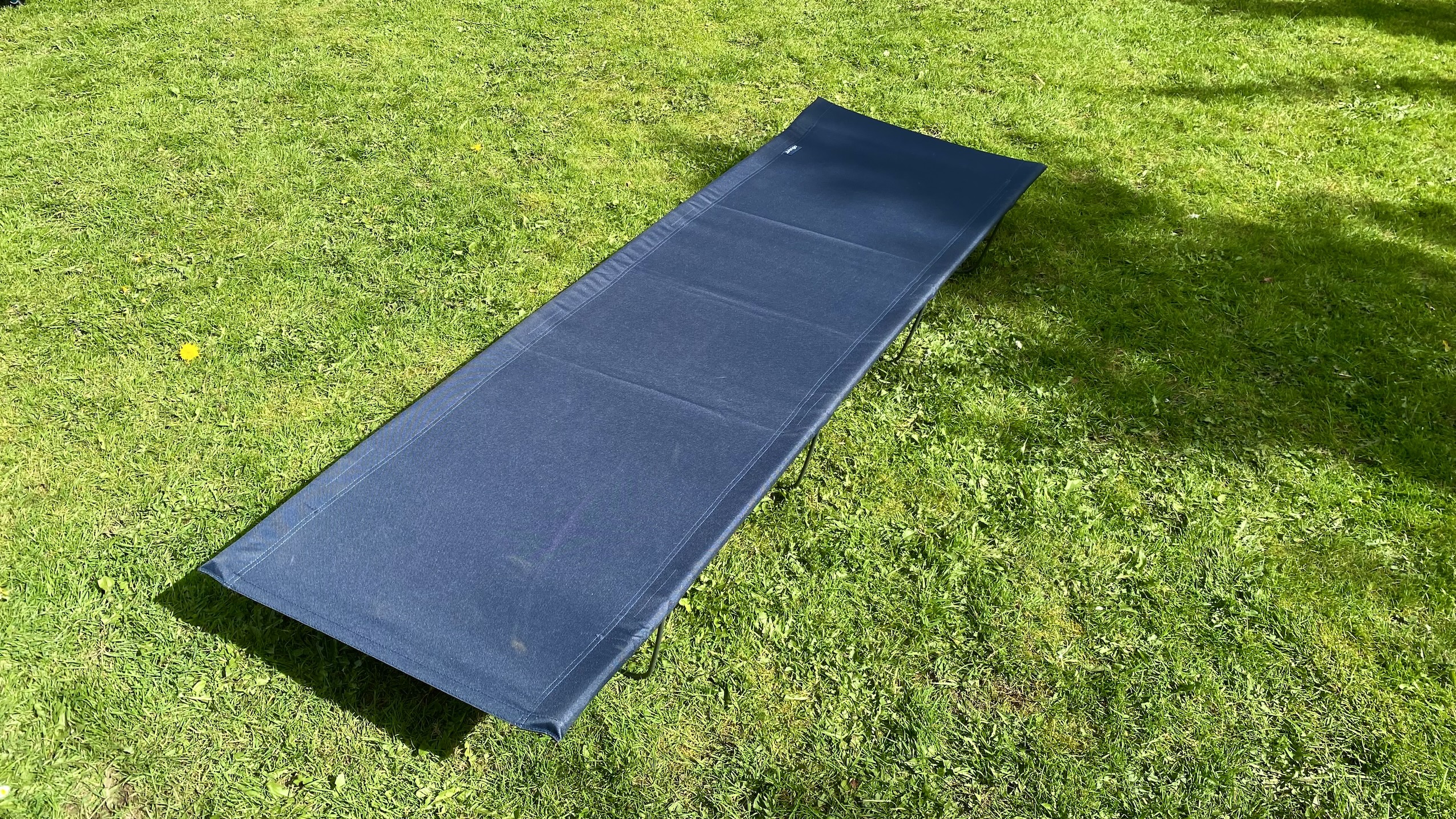
If you thought the OEX was a bargain wait till you check out the Vango Hush Campbed. At just £35, this camping cot is quite possibly the cheapest on the market. But there are reasons for that because a) it’s nothing like as well engineered as the Helinox or OEX and b) it uses indestructible steel tubes for the frame instead of aluminium which means it’s quite a weighty thing to lug around. In fact, at 3.45kgs, it’s 1.24 kilos heavier than the Helinox and 770 grams more than the OEX. Nevertheless, this camping cot is still portable enough for a sturdy backpacker on a budget and a perfectly acceptable option for short bike camping stints.

Despite the spindly legs, the Vango Hush is sturdier when assembled than you might think
One the oddest things about the Vango Hush is the design of its four legs which are, to all intents and purposes, just rods of thin, curvy steel. Also, the main steel frame tubes are not joined by any elastic and nor do they have any spring-loaded locks in place to hold them all together. To say that this bed is a faff to assemble is an understatement but I will try to explain the process in as few words as possible.
The first thing you need to do is unfurl the Endure polyester fabric sleeping surface. Now grab the steel frame poles and thread them one at a time into the slim sleeves on either side of the mat and awkwardly align the large holes in each pole so they’re facing up. Next, slot a leg end into one of the holes and, with all your might, attempt to bend the leg enough to awkwardly locate its loose end into the other hole. This process is definitely best performed while wearing sturdy rubber gloves because the legs are only about 7mm in width and it requires a lot of force and accuracy to locate the second hole.
Once you have all four legs in situ the bed is ready to sleep on. But don’t be alarmed by the wobbliness of the whole thing which at first feels like it might collapse when you place your body weight on the sleeping area. Surprisingly, the tension applied to the Vango’s spindly legs does a very decent job of keeping the legs in place, even when you shift your body weight around a bit. That said, I would definitely adhere to the product’s 100kg weight limit. The good news is that this cot is the quickest to dismantle – simply pull out one side of each leg and it all collapses in a thrice. Just be sure to keep each leg under tension because they ping out quite violently.
Performance
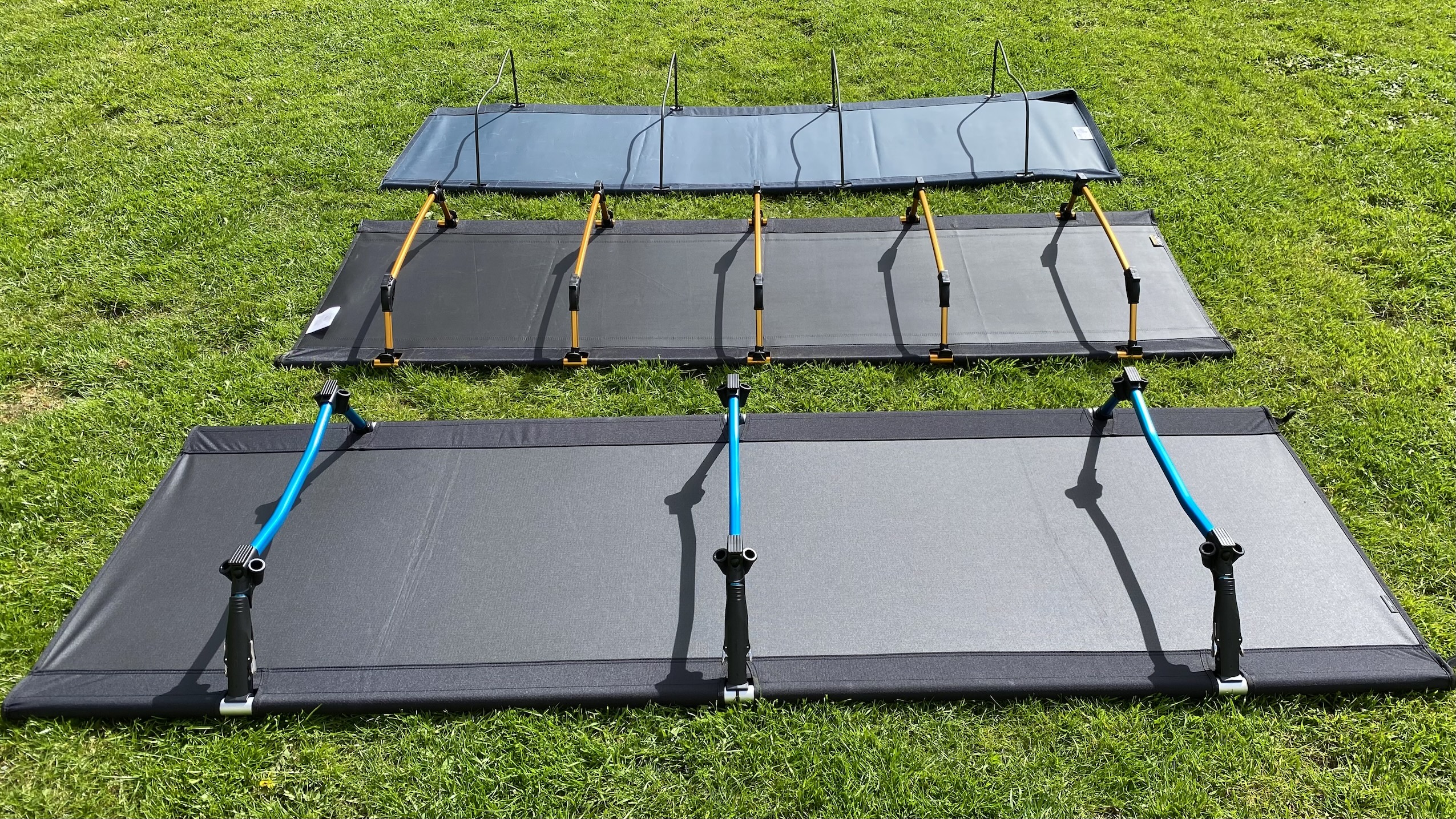
From bottom to top – Helinox, OEX and Vango
In terms of comfort, the Helinox Cot One Convertible is as close to perfection as you could wish for from a camping cot. Its Bluesign-certified and recycled 300D polyester ripstop fabric has just the right amount of give while providing excellent body support. It doesn’t feel too firm and it doesn’t sag too much, even when used by someone near the maximum 145 kilos in weight. At 67cm in width, it’s just about wide enough for a side sleeper though another 3cm would have been even better, especially if it were to be used with a mattress.
The Helinox is perfectly comfortable enough as it is with an insulating blanket and sleeping bag, though, naturally, comfort levels skyrocket as soon as you place a self-inflating mattress on top. Which reminds me. If you’re looking for even more comfort and warmth without having to haul a self-inflating mattress around, you’ll be pleased to learn that this model is also available with an integral sleeping pad. It’s called the Cot One Convertible Insulated (retailer link), and it’ll set you back another £100.
The Helinox Cot One Convertible sits 16cm off the ground, which is a perfect height, in my opinion, since it allows for extra headroom in smaller tents where the bedroom fabric sags down at an angle. Nevertheless, if there’s more space in your tent, this model’s height can also be extended by adding Helinox’s 12 optional Cot Leg Extensions (£90), which take the height of the bed to a lofty 43cm off the ground.
At just 2.3kg in weight, the Helinox Cot One Convertible is one of the lightest models on the market, so you’ll hardly notice it on your back. Its build quality, too, is simply matchless. In fact, I think Helinox has nailed every single detail with this cot, and I have absolutely nothing negative to say about it.
The mere fact it uses just three legs supports when others use up to five and six speaks volumes about the design. Yes, it’s expensive to buy, but then so is a Rolex or Miele washing machine. In other words, you really do get what you pay for with this camp cot.
If money isn’t much of a hindrance, I really don’t think you’ll find a lighter and better-constructed model for backpacking, bike camping, car camping or even use as an emergency bed at home.
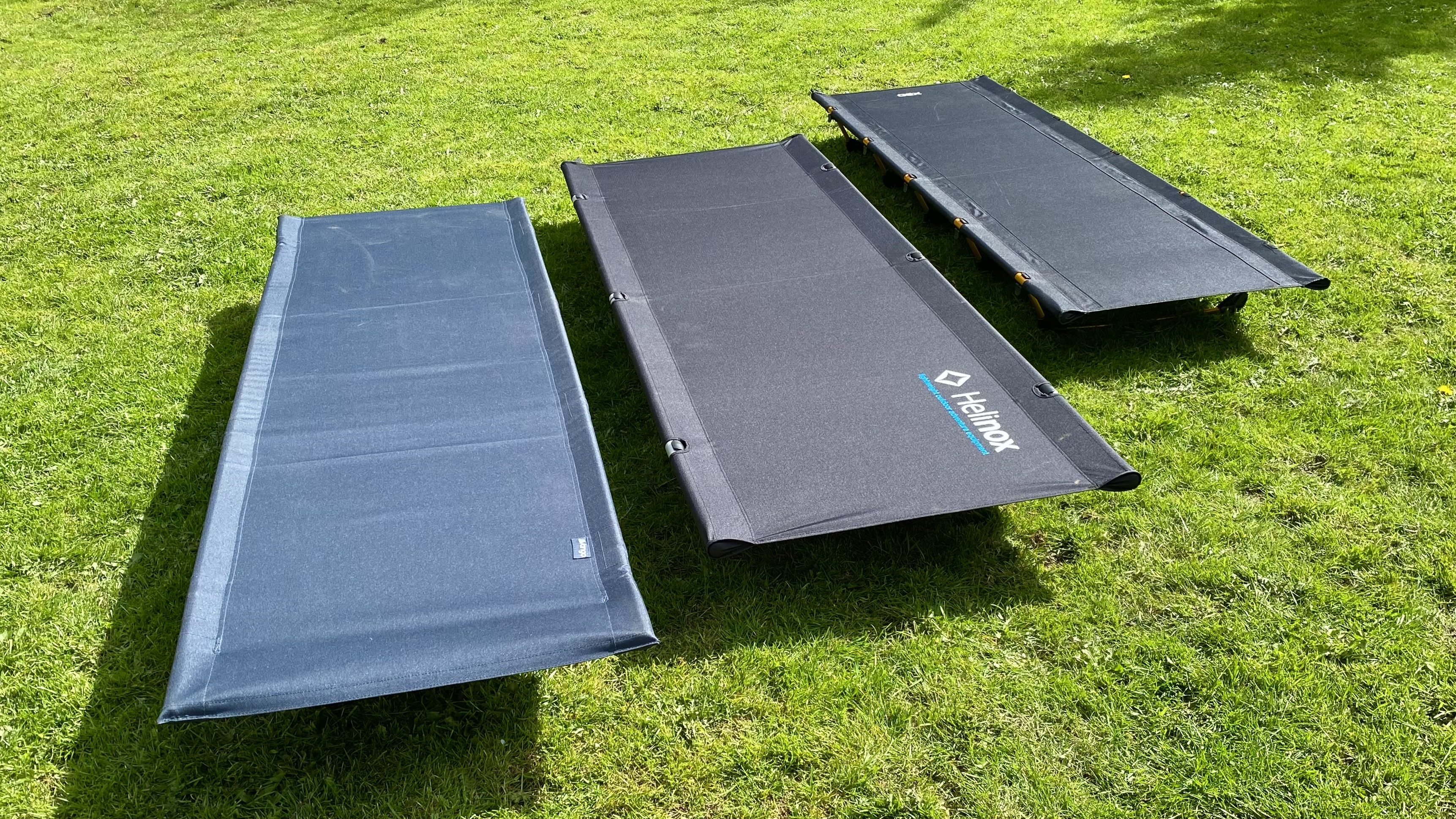
From left – Vango, Helinox and OEX
Against all odds – at least given the much lower price – the OEX Ultralite is perfectly comfortable to sleep on as is, ie without a self-inflating mattress. No, it doesn’t have quite the same level of suppleness as the Helinox, and at 185cm in length and just 60cm in width, it’s quite a bit shorter and narrower, so it’s perhaps not especially suitable for taller or larger users (it has a weight limit of 120kgs against the Helinox’s 145kgs). That said, any average-sized backpacker will likely have no issues sleeping on this bed, though it might feel a tad too narrow for some side sleepers.
The OEX Ultralite hovers at just 12cm off the ground (just 4cm shy of the Helinox), so it’s a perfect height for smaller tents and for storing a few small possessions beneath. However, like most camping cots, you may need to assemble this model inside a small one- and two-person tent lest it doesn’t fit through the doorway.
For the price, the OEX Ultralite genuinely impressed me. It’s easily light enough for backpacking and possibly even some orienteering, and it’s almost as comfortable as the much more expensive and, dare I say, better-engineered Helinox. Although it packed down quickly, the setting up process was a lot more strenuous and time-consuming, so you might need to do a few muscle-pumping exercises before tackling it.
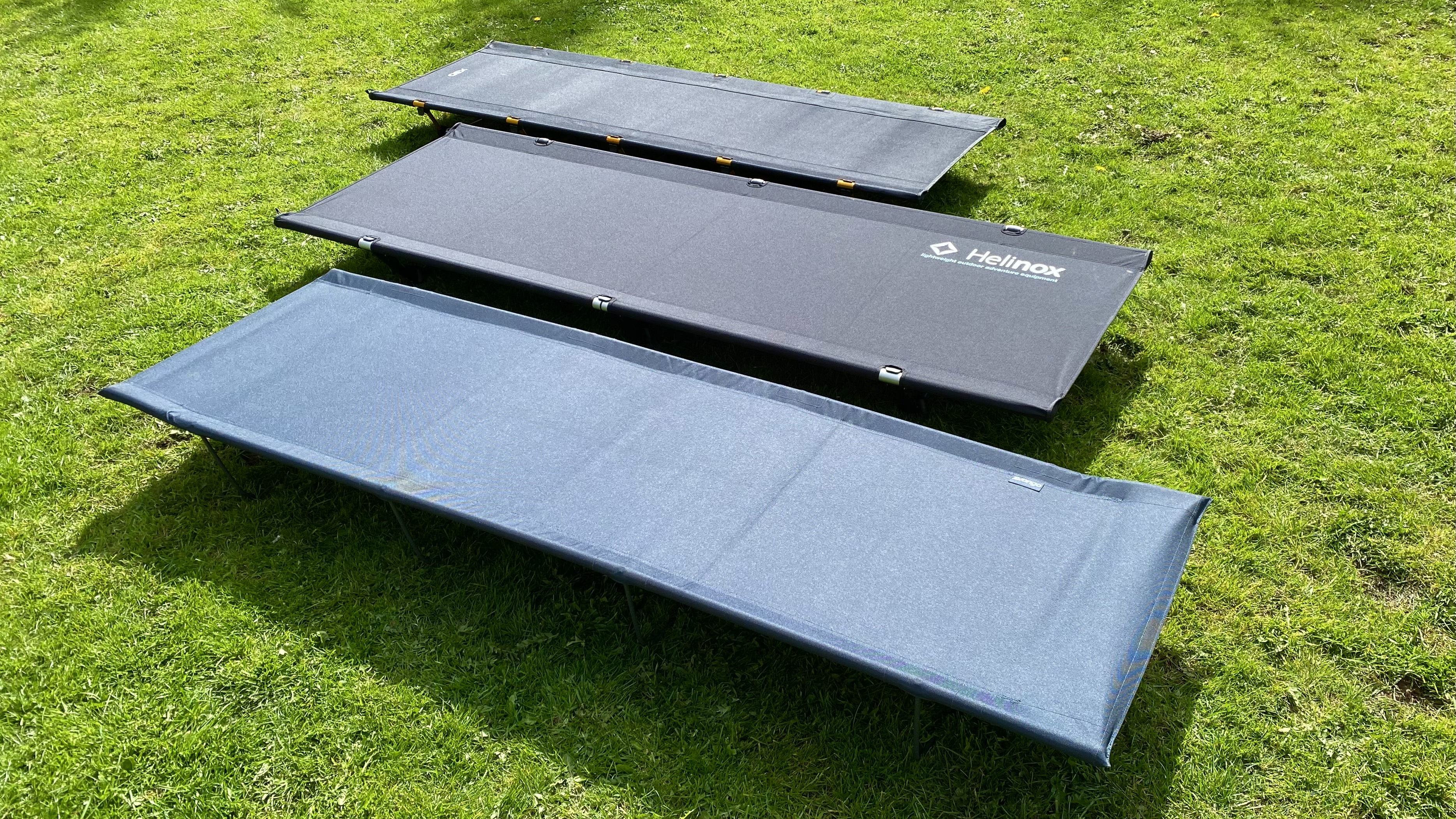
What’s the Vango Hush like to sleep on? Since I am small-bodied (5’6”) and weigh about 62 kilos, it was just about okay for me, though I definitely wished it had more width so my elbows had more space. At 182cm in length and just 58cm in width, I’d say this cot is better suited for young teenagers who would have more room to sleep on their sides.
That said, the fabric sleeping surface seemed supple enough for a decent night’s kip but I’m not sure I could handle more than a couple of nights on it unless used with a self-inflating mattress. I should add at this point that a larger Vango Hush Grande (retailer link) version is also available (which I wasn’t able to get hold of).
At 199cm in length and a substantial 76cm in width, this model is far better suited to taller users while providing much more elbow space than either the Helinox or OEX. However, at 4.24 kg, the Hush Grande is almost twice the weight of the Helinox Cot One Convertible.
Not everyone has the funds to splash out in excess of £300 on a camping cot so I think £35 is a very reasonable price to pay. But the jury’s out on whether it wouldn’t be better to simply stick to a decent standard 70cm Vango Single Flocked (retailer link) airbed which is bulkier to pack but, at just 1.25kgs, much lighter to carry.
Which should I buy?
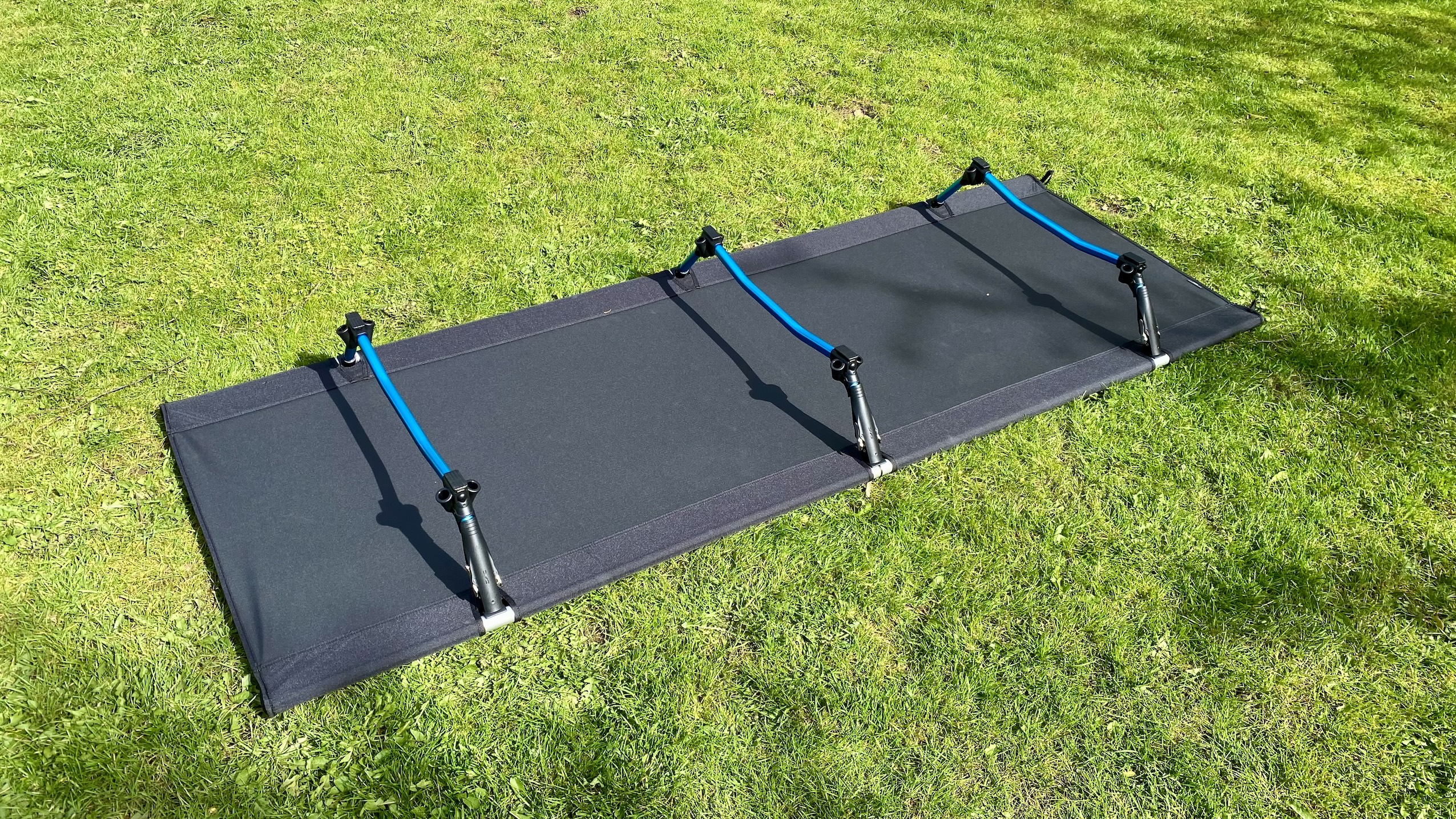
The Helinox Cot One Convertible is far and away the most thoughtfully designed camping cot in this bedding battle
If money’s no object, the Helinox Cot One Convertible wins this contest hands down. It is simply matchless for design, build quality, weight and, above all, sleeping comfort. It frankly blew me away.
The OEX Ultralite is indisputably the best-value camping cot in this three-way battle. Yes, it’s a pain to set up and its too short and too narrow for large-framed users. But in its favour, it’s very light to carry, extremely sturdy and comfortable enough to sleep on.
By contrast, the ultra-cheap Vango Hush is less appealing both in terms of construction and the size of the sleeping area. I’m not a fan of the leg system either, which felt wobbly despite being relatively sturdy. And there’s no denying the extra weight all that steel adds to the backpack. But, hey, it’s just £35, so it’s still worth considering if you only camp for a couple of nights at a time.
Before you go, here’s a sterling alternative for car and bike campers
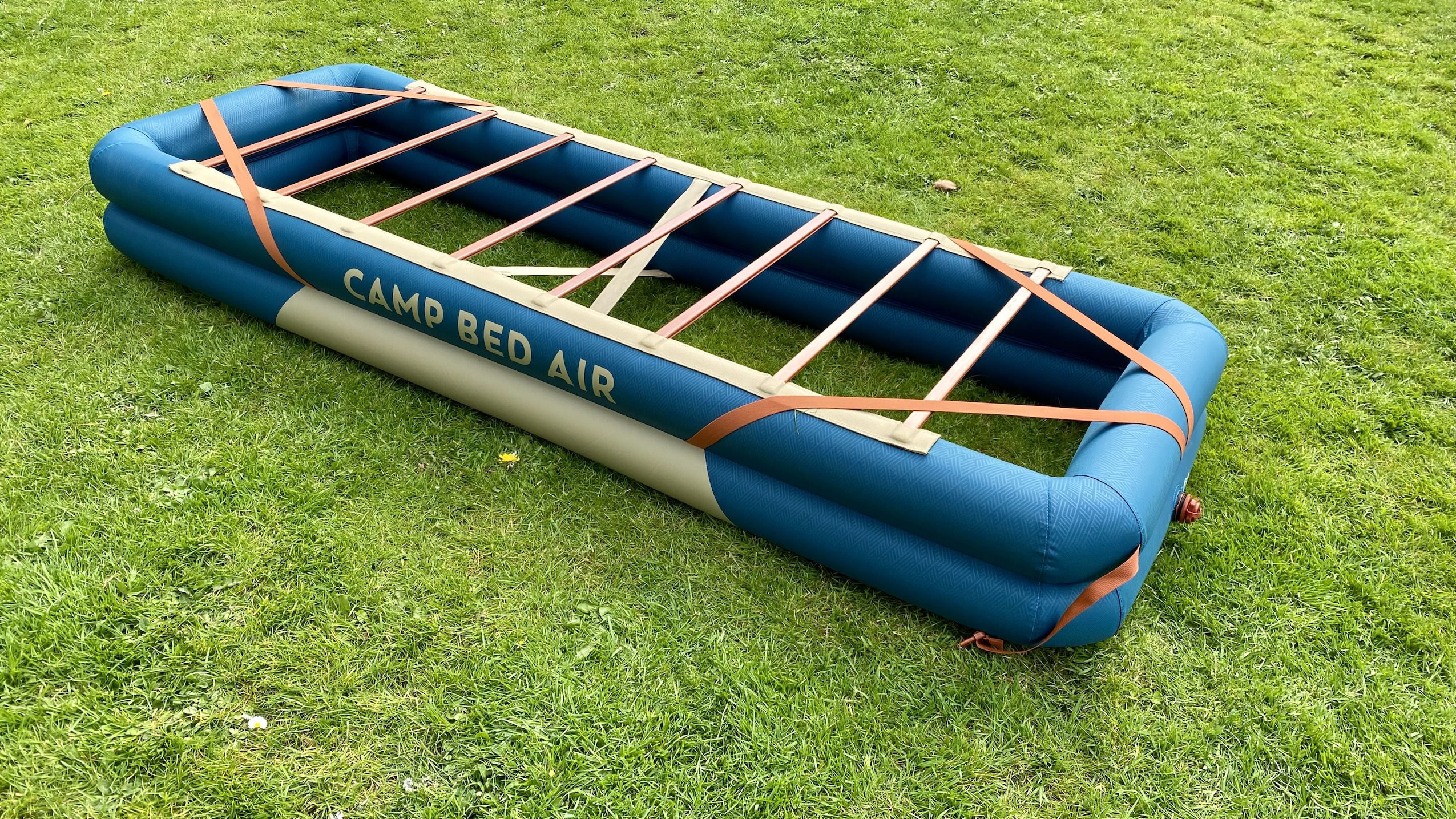
Quechua Inflatable Camping Bed Base
Although this particular camping bed isn’t suitable for backpackers, it’s an ideal option for car camping and possibly even a spot of bicycle camping. The Quechua Inflatable Camping Bed Base from Decathlon is not so much a camping cot as a fully-fledged bed base with proper bed-like slats and a supportive air-filled surround that might well make it the most comfortable outdoor sleeping solution on the market. However, the use of an accompanying self-inflating mattress like Quechua’s stupendously cosy 8cm Ultim Comfort Inflatable Camping Mattress is absolutely paramount with this model because, well, who wants to sleep on a row of polyester slats?
The Quechua weighs 4.12 kg, so it’s not suitable for bare-bones backpacking. However, because it rolls up into a tidy bundle (70cm x 14cm), it will take up very little room in a car, and it could also be easily transported on a bicycle if that is your preferred method of outdoor adventure.
This bed base requires inflation to 6 PSI via a good quality foot pump – or preferably an air pump like the excellent Quechua Ultim Comfort (retailer link) hand pump. Once fully inflated, the Quechua stands at a considerable 25cm in height, which is a very decent elevation for any medium to large family tent. Its 70cm width, meanwhile, is ideal for all 70cm self-inflating mattresses and most standard single airbeds.
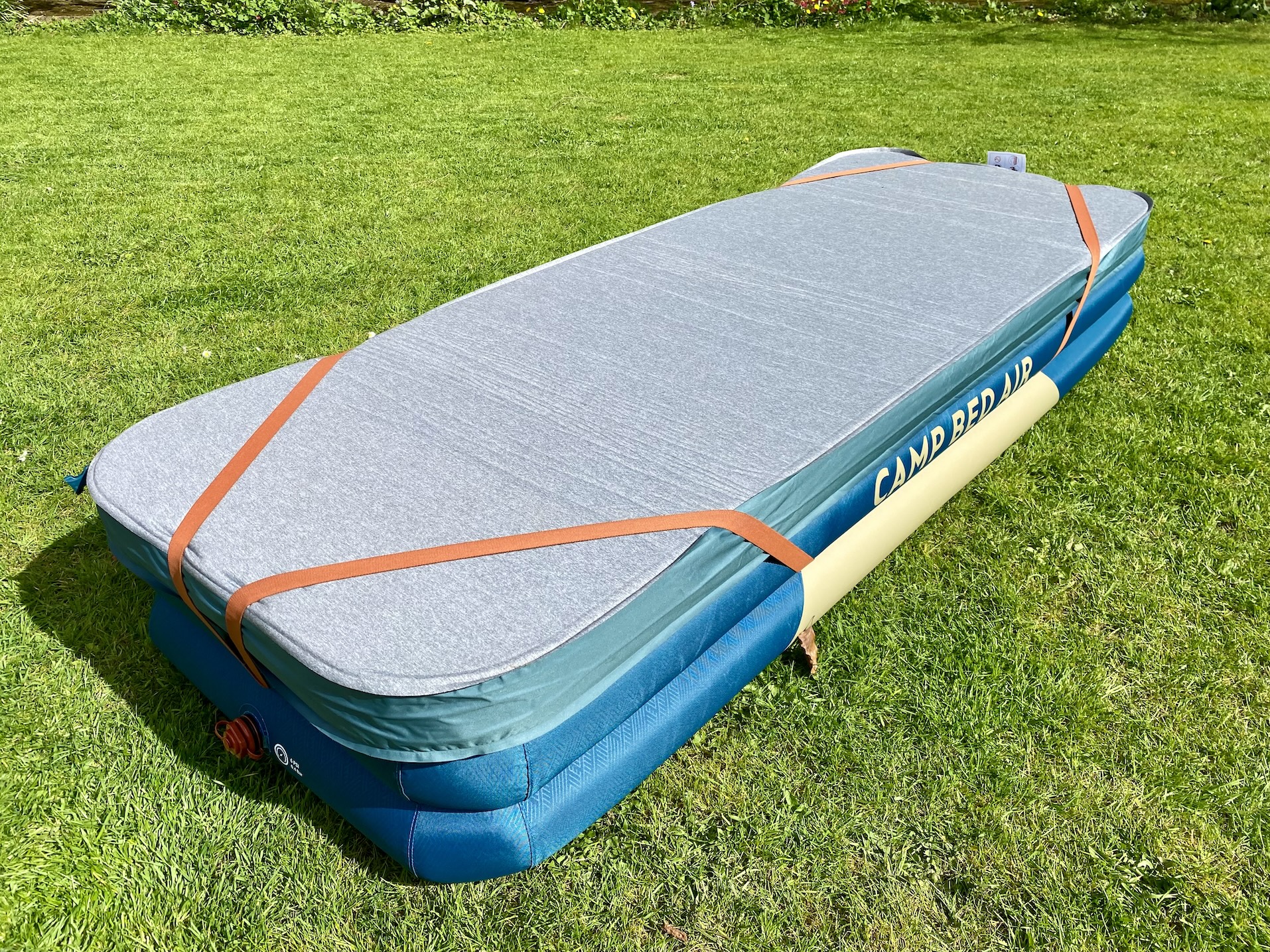
The Quechua Inflatable Camping Bed Base in tandem with the excellent Quechua Ultim Comfort Inflatable Camping Mattress
Construction is very clever and comprises two conjoined air tubes with a pair of polyester braces to keep it all in shape, plus eight firm but flexible polyester bed-like struts. Simply place your airbed or self-inflating mattress of choice on top, attach the elasticated securing straps and rest in the knowledge that you will very likely be the most comfortable visitor on the entire campsite come bedtime.
Another great thing about this bed base is that it can be clipped to another one to create a full double bed that won’t separate in the middle of the night. And a final bonus comes in the form of a large and completely hidden area beneath the bed to store valuables like cameras, iPads, passports etc. Out of sight, out of mind, in other words.
The Quechua Bed Base arrives tightly folded into a nylon carry bag that turns out to be a bit smaller than you’d like when trying to stuff it back in again – an extra few centimetres of girth would have made all the difference when packing up. That aside, the Quechua Bed Base is a cracking option for a remarkably relaxed night’s slumber under the stars.
Derek (aka Delbert, Delvis, Delphinium, Delboy etc) specialises in home and outdoor wares, from coffee machines, white appliances and vacs to drones, garden gear and BBQs. He has been writing for more years than anyone can remember, starting at the legendary Time Out magazine – the original, London version – on a typewriter! He now writes for T3 between playing drums with his bandmates in Red Box (redboxmusic).
